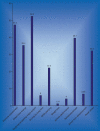Assessment of pattern for consumption and awareness regarding energy drinks among medical students
- PMID: 24351105
- PMCID: PMC3976099
- DOI: 10.1186/2049-3258-71-31
Assessment of pattern for consumption and awareness regarding energy drinks among medical students
Abstract
Background: Energy drink is a type of beverage which contains stimulant drugs chiefly caffeine and marketed as mental and physical stimulator. Coffee, tea, soft drinks and other caffeinated beverages are not considered as energy drinks. Purpose of our study was to evaluate the awareness of medical students regarding energy drinks and their pattern and reason of energy drinks consumption.
Methods: This was a cross sectional and observational study conducted during the period of January - December 2012 at four Medical Colleges (Dow Medical College, Sindh Medical College, Jinnah Medical College and Liaquat National Medical College) of Karachi, Pakistan. Over all 900 M.B.B.S students were invited to participate after taking written consent but viable questionnaire was submitted by 866 students, estimated response rate of 96%. All data was entered and analyzed through SPSS version 19.
Result: Out of 866 participants, majority were females 614 (70.9%) and only 252 (28.5%) were males, with a mean age of 21.43 ± 1.51 years. Energy drinks users were 350 (42.89%) and non users were 516 (59.58%). Only 102 (29.3%) users and 159 (30.7%) non users know the correct definition of Energy drinks. Regarding awareness, mostly user and non users thought that usage of energy drinks had been on rise due to its usefulness in reducing sleep hours [users193 (43.9%), nonusers 247 (56.1%) (p < 0.05)], for studying or completing major projects [users184 (45.0%), nonusers 225 (55.0%) (p < 0.05)] and for refreshment purposes [users179 (44.9%), nonusers 220 (55.1%) (p < 0.05)]. Two main reasons of not using energy drinks by non-users were "awareness from its side effects" 247 (47.8%) and "have no specific reason" 265 (51.3%). Most common side effects reported by users were fatigue 111 (31.7%) and weight gain 102 (29.4%).
Conclusion: In sum, the fact that despite serious side effects of weight gaining and fatigue, practice of consuming energy drinks is highly prevalent among medical students, particularly because they are ever ready to boost their energy level and reduce sleep hours due to stress of exams and projects. This warrants the creation of continued public health awareness about the appropriate use of caffeinated beverages, their potential benefits, side effects and correction of wrong perceptions.
Keywords: Behavior; Energy drinks; Palpitation.
Figures


Similar articles
-
A survey of energy drink consumption patterns among college students.Nutr J. 2007 Oct 31;6:35. doi: 10.1186/1475-2891-6-35. Nutr J. 2007. PMID: 17974021 Free PMC article.
-
Behavioral and physiologic adverse effects in adolescent and young adult emergency department patients reporting use of energy drinks and caffeine.Clin Toxicol (Phila). 2013 Aug;51(7):557-65. doi: 10.3109/15563650.2013.820311. Epub 2013 Jul 19. Clin Toxicol (Phila). 2013. PMID: 23869657
-
Motivations Influencing Caffeine Consumption Behaviors among College Students in Korea: Associations with Sleep Quality.Nutrients. 2020 Mar 30;12(4):953. doi: 10.3390/nu12040953. Nutrients. 2020. PMID: 32235502 Free PMC article.
-
Energy drink consumption is associated with unhealthy dietary behaviours among college youth.Perspect Public Health. 2015 Nov;135(6):316-21. doi: 10.1177/1757913914565388. Epub 2015 Feb 9. Perspect Public Health. 2015. PMID: 25667166 Review.
-
[Risks of energy drinks in youths].Arch Pediatr. 2010 Nov;17(11):1625-31. doi: 10.1016/j.arcped.2010.08.001. Arch Pediatr. 2010. PMID: 20926266 Review. French.
Cited by
-
Factors Influencing Energy Drink Consumption in Participants and Viewers of Extreme Sports.J Nutr Metab. 2020 Oct 7;2020:9382521. doi: 10.1155/2020/9382521. eCollection 2020. J Nutr Metab. 2020. PMID: 33083056 Free PMC article.
-
Energy drinks in Tamale: Understanding youth perceptions, consumption patterns, and related factors.PLoS One. 2024 Apr 26;19(4):e0289391. doi: 10.1371/journal.pone.0289391. eCollection 2024. PLoS One. 2024. PMID: 38669248 Free PMC article.
-
Stimulant Usage by Medical Students for Cognitive Enhancement: A Systematic Review.Cureus. 2021 May 22;13(5):e15163. doi: 10.7759/cureus.15163. Cureus. 2021. PMID: 34178492 Free PMC article. Review.
-
Prevalence, Knowledge, and Attitudes of Energy Drink Consumption Among University Students in the United Arab Emirates: A Cross-Sectional Study.Cureus. 2025 Apr 27;17(4):e83073. doi: 10.7759/cureus.83073. eCollection 2025 Apr. Cureus. 2025. PMID: 40432637 Free PMC article.
-
Consumption of energy drinks among Turkish University students and its health hazards.Pak J Med Sci. 2019 Mar-Apr;35(2):537-542. doi: 10.12669/pjms.35.2.638. Pak J Med Sci. 2019. PMID: 31086547 Free PMC article.
References
-
- Energy drink. http://en.wikipedia.org/wiki/Energy_drink.
-
- Seidl R, Peyrl A, Nicham R, Hauser E. A taurine and caffeine-containing drink stimulates cognitive performance and well-being. Amino Acids. 2000;71(3–4):635–642. - PubMed
LinkOut - more resources
Full Text Sources
Other Literature Sources

